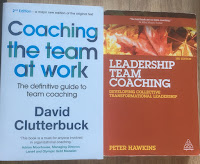 I have blogged a few times about the work of Nancy Kline and her Thinking Environment; and how the quality of listening that she champions helps people who are listened to in that way to think at their very best.
I have blogged a few times about the work of Nancy Kline and her Thinking Environment; and how the quality of listening that she champions helps people who are listened to in that way to think at their very best.But what I think has been neglected (or at least, I have seen and heard little about this) is the effect of listening in that way on the listener. So in this post, I consider the Thinking Environment - listening in that way - from the other end, as it were.
By 'listening in that way,' I mean embodying the ten components of a Thinking Environment: Attention, Ease, Equality, Difference, Appreciation, Information, Encouragement, Feelings, Incisive Questions and Place. See my post here for my earlier discussion of these.
My hypothesis is that, over time, the practice of listening in this way instils habits in the listener that become part of his or her character; and I am mindful here of Aristotle's view of virtues being habits of good behaviour.
 My idea, therefore, is that these ten components are helping me (and others who follow this discipline, of course) to acquire and integrate certain good habits into our repertoire, and this blog post, as usual, is my thinking out loud, as it were, about this idea.
My idea, therefore, is that these ten components are helping me (and others who follow this discipline, of course) to acquire and integrate certain good habits into our repertoire, and this blog post, as usual, is my thinking out loud, as it were, about this idea.So what virtues do I think that it fosters?
In the first place, generosity: the gift of full attention, laying aside one's own interests and concerns for a while and creating that sense of ease which is essential to this work, as well as making the effort to overcome our embarrassment and offer genuine appreciation of the other person, are all generous acts.
Linked to that, but separate, is an appropriate humility. The component of equality reins in our ego, and any tendency that we may have to assume that we know best. And that is not merely an intellectual posture: the actual practice of listening in this way is often humbling. As people reveal their thinking I am frequently in awe of their qualities, not just in terms of the solutions they discover to the issues they are addressing, but also the values they bring to bear: vulnerability, compassion, tenacity and many others are frequently displayed. Interestingly, that same component of equality helps us to guard against a false self-deprecation: whilst we are to see ourselves as no better than the other person, we are also to see ourselves as no worse; and for some of us, that is a healthy restorative.
 And linked to humility is something about genuine interest in other people and their perspectives that will tend towards wisdom. The component of difference is relevant here: valuing other people's perspectives and seeking to learn from them, rather than simply discount them or over-ride them with our own. This is one path to learning, of course...
And linked to humility is something about genuine interest in other people and their perspectives that will tend towards wisdom. The component of difference is relevant here: valuing other people's perspectives and seeking to learn from them, rather than simply discount them or over-ride them with our own. This is one path to learning, of course... Finally, I think the practice of listening like this can lead to increased self-insight. In particular, that can arise from the openness to difference, already discussed, and also from the questioning of assumptions that underpins the formulation of Incisive Questions. The constant quest for assumptions that others make, and our critical engagement with them increases our ability to recognise our own.
Finally, I think the practice of listening like this can lead to increased self-insight. In particular, that can arise from the openness to difference, already discussed, and also from the questioning of assumptions that underpins the formulation of Incisive Questions. The constant quest for assumptions that others make, and our critical engagement with them increases our ability to recognise our own.Therefore, I continue to work in this way, where appropriate, not only because of the utilitarian reason, that it seems to work for my clients; but also because of the personal development imperative: it is helping me to become more the kind of person I aspire to be (from which my more perceptive readers will realise that I see myself as someone who needs to increase his generosity, humility, wisdom, and self-insight - not an unworthy project for the next few years).
--
With thanks to Mimi Thian, Iqx Azmi, Jordan McDonald and Markel Hall for sharing their photography via Unsplash.




















